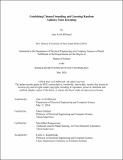| dc.contributor.advisor | Médard, Muriel | |
| dc.contributor.advisor | Rangaswamy, Muralidhar | |
| dc.contributor.author | Millward, Jane Avril | |
| dc.date.accessioned | 2024-08-21T18:53:08Z | |
| dc.date.available | 2024-08-21T18:53:08Z | |
| dc.date.issued | 2024-05 | |
| dc.date.submitted | 2024-07-10T12:59:46.274Z | |
| dc.identifier.uri | https://hdl.handle.net/1721.1/156274 | |
| dc.description.abstract | This thesis investigates how channel estimation can be used to improve the performance of Guessing Random Additive Noise Decoding. The trade-off between devoting resources to channel sounding and data transmission is investigated for pilot symbol assisted modulation schemes. Using a soft-information variant of the GRAND algorithm called Ordered Reliability Bit Guessing Random Additive Noise Decoding- Approximate Independence (ORBGRAND-AI), it is shown that by accounting for the correlation between received symbols bit and block error rate improvements can be obtained. This thesis also considers the achievable communications rate of ORBGRAND-AI when different estimators are used to provide channel estimates. Finally, this thesis investigates the use of ORBGRAND-AI in channels subjected to inter-symbol interference (ISI). | |
| dc.publisher | Massachusetts Institute of Technology | |
| dc.rights | In Copyright - Educational Use Permitted | |
| dc.rights | Copyright retained by author(s) | |
| dc.rights.uri | https://rightsstatements.org/page/InC-EDU/1.0/ | |
| dc.title | Combining Channel Sounding and Guessing Random Additive Noise Decoding | |
| dc.type | Thesis | |
| dc.description.degree | S.M. | |
| dc.contributor.department | Massachusetts Institute of Technology. Department of Electrical Engineering and Computer Science | |
| mit.thesis.degree | Master | |
| thesis.degree.name | Master of Science in Electrical Engineering and Computer Science | |
